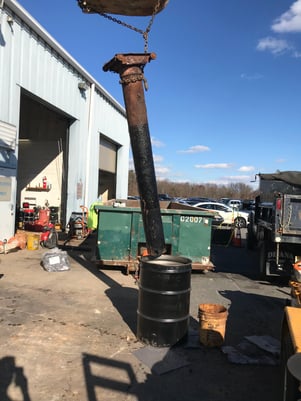NJDEP LSRP (Licensed Site Remediation Professional)
What is the NJDEP LSRP Program?
The following information regarding the LSRP program pertains to commercial property owners. Homeowners with unregulated heating oil tanks are not required to enter into the LSRP program.
Curren offers Licensed Site Remediation Professional (“LSRP”) Services. The New Jersey Site Remediation Reform Act (“SRRA”), approved in May 2009, set in place the requirements for environmental professional licensing as Licensed Site Remediation Professional (“LSRPs”). The program has been modeled after a similar program in Massachusetts initiated in 1993. It is reported that the NJDEP currently has over 15,000 cases awaiting remedial activity. The implementation of the LSRP Program would result in a significant increase in the amount of sites restored in a timely manner.
If you own a commercial property or residential property that regulated contamination (pretty much anything other than heating oil that has contamination you need to hire an LSRP to help you navigate New Jersey's environmental regulations.The New Jersey Licensed Site Remediation Professional (LSRP) program changes NJDEP oversight of the investigation and cleanup of contaminated commercial properties in New Jersey. Instead of an NJDEP representative actively managing and reviewing work performed, commercial property owners must hire an LSRP to perform and certify that the commercial site is in compliance with New Jersey environmental regulations. The program requires owners of commercial properties in New Jersey that are known to have some level of contamination (i.e., property has an NJDEP case number) to hire an NJDEP LSRP. Hiring an LSRP is akin to hiring an accountant or attorney to handle your respective financial and legal issues. An LSRP is an environmental professional with at least 10,000 hours of environmental remediation and investigation experience and is knowledgeable of New Jersey's environmental regulation. (N.J.A.C. 17:26E Technical Requirements for Site Remediation).

Commercial property owners that have a discharge will receive written notices from the NJDEP informing them that they must engage an LSRP to manage their environmental issues.
(Residential property owner's with underground heating oil tanks are NOT required to enter into the LSRP program.)
The NJDEP has mandatory deadlines to address the discharge including defining the extent and remediation. Annual fees are required until the site received an unrestricted RAO (Response Action Outcome). The idea behind the fee is to motivate parties to move forward. The fees are based on what media is impacted. Soil impacts are one fee, soil and groundwater a higher fee.
Curren offers a free one hour consultation of your case, call 888-301-1050 to speak to one of our environmental professionals.
The key idea of the New Jersey SRRA Program is so that the NJDEP can focus their resources on the more important sites and to allow the responsible parties to move the remediation process along without extensive NJDEP review and comments. The LSRP has the educational and experience background to act as the enforcement arm of the NJDEP and is allowed to move remediation projects forward without NJDEP pre-approval. The LSRP ensures that sites are investigated and remediated in accordance with the NJDEP Technical Requirements for Site Remediation.
The LSRPs will issue Response Action Outcomes “RAOs” for sites where the remediation has been completed. The RAOs take the place of the currently issues No Further Action Letters.
LSRPs are overseen by a board of 13 members and approximately 10% of LSRP cases which are closed with an RAO will be reviewed or audited for compliance to the Technical Requirements and to confirm that the site remediation approach is protective of human health and the environment. The NJDEP will still act as the final approval authority through the auditing process.
The LSRP is charged with the responsibility of reporting any issue deemed an Immediate Environmental Concern (“IEC”) on any site the LSRP is involved with including due diligence assessments.
Responsible parties, under the SRRA program, remain responsible for regulatory compliance issues and are held to mandatory time frames. If a Responsible Party misses a deadline, they may be forced into the “Direct Oversight Program” where the NJDEP becomes the primary oversight on the case. This also opens up the Responsible Party to possible enforcement actions. Other issues which will require NJDEP Direct Oversight would include chromate contaminated wastes, environmentally-sensitive areas where natural resource damages have occurred, some contaminated sediment sites and sites which have been ranked as a priority based on exposure of human health and the environment.




